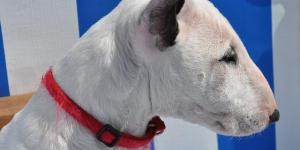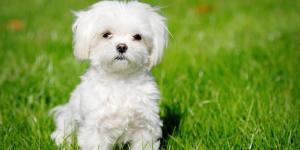How to Care for a Golden Retriever - From Puppy to Adulthood


Golden retrievers are a very popular breeds of dogs. They are friendly, dynamic and playful in their nature and have a beautiful appearance. These factors have made Golden retrievers a favorite for families as it is a breed that is also friendly to children. Like any other pet, it requires specific care that will be dictated according to the animal's age. In oneHOWTO we give you guidance on how to care for a Golden Retriever so that your dog is healthy and grows strong.
The right amount of food
Watch its food. Whilst still a puppy, following the animal being weaned, it is important to start creating habits by establishing mealtimes. Feed your golden retriever puppy three to four times a day (preferably at a similar time when you eat). If after 30 minutes of placing the feeding bowl on the ground the dog has not eaten, remove the bowl and wait for its next feeding time. This will help your pet understand that there are moments to eat and moments for playing, something that may be difficult for the dog to understand as it is a very active breed.
Regarding the actual food, a question that often arises is what amount of food to offer the dog. It is important you feed your dog quality food so it can grown into a healthy adult.
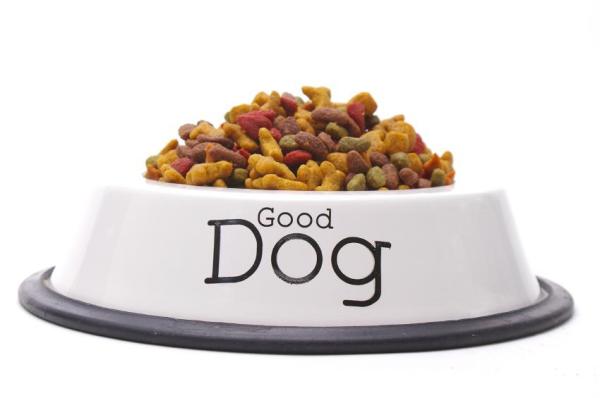
The puppy's weight
Monitor your puppy's weight. The golden retriever has tendency towards obesity, so you must know how to balance the amount of food together with physical activity. Remember that an over fed dog, in a way similar to that of a human, can present many health problems.
It is important not to overdo treats and prizes such as dog biscuits nor give your food to the animal, this will avoid the dog from becoming overly gluttonous.
Moreover, you should not feed your retriever human food such as tomato or chocolate, as there is many food that is toxic for dogs and can harm their digestive system.
The golden retriever's fur
Groom your golden retriever. One of the biggest attractions of these dogs is its fur, which it is beautiful and lush, but this also requires attention and care.
Brush daily
Among the routines necessary to care for a Golden Retriever we find the need to brush it daily or every two days; this will prevent your house being full of hairs and also reduce odors in the coat of the animal. Do so with a specific metallic, thin brush to make sure you also get rid of possible external fleas your dog may have.
Accustom your pet to this action from when it is a puppy. It will also help avoid knots forming in the hair of the animal and you will foster a special bond between you.
Trim its fur
Golden retrievers have double layer fur. This means that there is one layer to protect from water and sun and an internal layer that will shed depending on the season. It's important to have your dog's hair trimmed each molting season so it doesn't lose too much hair when shedding.
Do not shave your dog's fur off, this will only cause tangling and make its shed further.
Bathing your golden retriever
To care for your golden retriever's coat, it's also important to bathe it every month or month and a half, a rule that must only be broken if its fur gets significantly dirty or impregnated in any substances which are toxic or hazardous for the animal. Excessive washing can damage the hair and skin of the animal, however, you can use a dry shampoo or a damp cloth should you want to remove dirt from its fur. The ears deserve special care and cleaning to prevent parasites and fungi from growing in them. Remember to dry its fur with a towel properly so that there is no moisture accumulation. You may use a hair dryer, but you will need to get your golden retriever puppy used to it from an early age so it doesn't get scared of the noise.
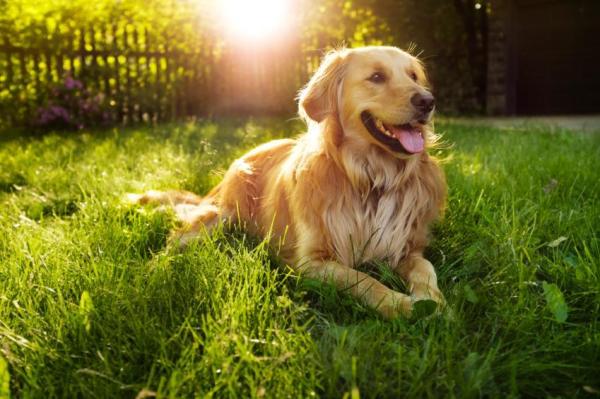
Shedding
Watch out for excessive shedding. Although Golden retrievers naturally lose hair, if you find that this happens in excess you should take it to the vet as this is a symptom of health problems that must be properly addressed. First of all you should find out why your dog sheds so much and then tackle the underlying problem. It's best to take your dog to a vet so it can be properly diagnosed in these cases.
Proper exercise
Exercise your golden retriever. In physical terms, this dog requires plenty of exercise, attention, cuddling and sharing with its master. It is not a pet that is suited to being left alone and away from the family but rather to be a part it. It loves walks and games, so you must find time to devote to your pet..
Golden retrievers are dogs that, despite their size and their fur, can adapt to well to living in an apartment but they do need exercise; owners that live in flats must remember to strive twice as hard to exercise their pet than owners that have a garden or a large terrace.
When choosing a lead, we recommend using a harness instead of attaching the lead to the collar, it will help your dog feel more secure and will give it a further sense of freedom.
You should exercise it every day for at least an hour as running and playing is very important for this animal. You should space out its walks into three, as it will need to drain its energy several times a day.
During your walks it's important you play catch with it, as the golden retriever is highly playful and fetching a stick or ball will keep your dog entertained and happy. If you live near a lake or sea all the better, golden retrievers love to jump in the water for a swim! You'll just need to make sure it doesn't go too far off and it's always under your supervision.
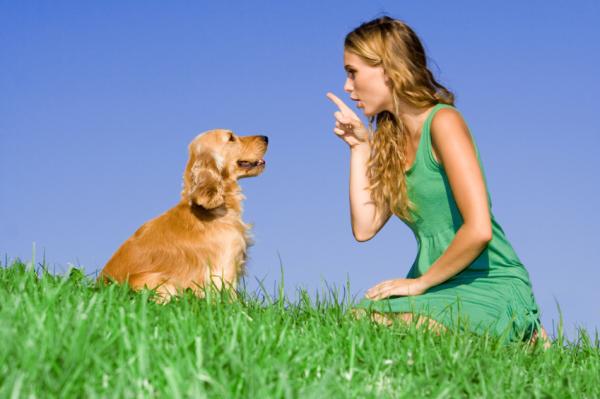
Golden retriever training
Train your golden retriever.Though golden retrievers are on the list of smartest dogs and are great for beginners who don't have much experience with dogs, there are certain aspects that you will need to work on if you want your golden retriever to behave properly. Start training your dog as a puppy and make sure you get all of these right:
Potty training
Teaching a golden retriever to go to the toilet will be a task that needs to be done very early on. Your dog will not be able to contain itself very long when it's a puppy, so it's important to keep a close eye on your pet to notice signs of needing to go and quickly take your dog to the place where it should do its necessities. Always take it to the same place as a puppy, this way it will relate the place to the necessity of having to go to the toilet. Give your dog a treat for good behavior at the beginning.
When at home, teach your dog to poop on newspaper or an absorbing surface. Only tell your dog off firmly when you have caught it in the act. Never do so if you find poop around the house, as your dog will not relate your anger to the fact of doing its business in that specific place.
Commands and mischief
As we've said, golden retrievers are very playful and active animals, so if you are not home very often, they may get into some trouble. Though it is very easy to train a golden retriever to obey commands such as sit, fetch, lie down and shake a paw, it may still feel lonely and bored if it spends too many hours by itself at home. Retrievers love biting, so we recommend you leave a kong at home so he or she can be entertained. We recommend you make sure it's never completely alone for more than 4 hours straight. Golden retrievers are great therapeutic dogs, so if you or your children cannot be on top of him, we suggest you take your dog to help in local therapeutic programs so he or she can help your community or get a nanny for it.
Puppy socialization
These animals are very friendly. However, it is always good to make them socialize with other animals from a young age. Remember to give them all the love and attention they deserve, with this and timely medical supervision your pet will be more than happy. It is also possible to socialize an adult golden retriever, though it does require more hard work.
Specific medical conditions
Special medical needs. Among the actions needed to care for a Golden Retriever we also find those that are the same for all dogs: the need to be taken to the vet twice a year for a health check up. Start taking your puppy to the first vet visit when it needs its first vaccinations, which is roughly at 6 weeks of age. In this first visit, it will be vaccinated for the following diseases:
- Distemper
- Parvovirus
- Leptospirosis
- Infectious Canine Hepatitis
- Parainfluenza (only in some conutries)
- Rabies (in some countries)
After this first vaccination, your dog will need boosters 2 to 4 weeks after these first shots. After the first year, their vaccination and anti-parasitical calendar will be less full, as you should only need to take your dog to the vet for checkup and vaccinations once a year.
Common diseases in Golden retrievers
The golden retriever is a pedigree dog that has been crossed for many years, which is why it can experience many specific illnesses and lesions related to genetic factors. This is why you should look out for the following:
- Dysplasia: This is a very common lesion in pedigree dogs. Dysplasia refers to malformation in the joints, and golden retrievers are specially prone to both hip dysplasia and elbow dysplasia.
- Obesity and bloating: This may not only be caused due to lack of exercise or excessive feeding, golden retrievers are also prone to hypothyroidism, which is why you should take your dog to the vet if you notice any unusual weight changes.
- Epilepsy: Believe it or not, epilepsy is not uncommon among this dog breed, which is why, if you detect symptoms of this condition, you should take your dog to an emergency vet.
- Aortic stenosis: The narrowing of the aorta and obstruction of this ventricle is a common heart disease that can affect your golden retriever. If you notice your dog gets more tired than usual or has fainted, you should take it to the vets so he or she can be diagnosed.
Life expectancy and old age
The average lifespan of a golden retriever is around 10 to 12 years, though there are cases of dogs that have lived up to the age of 20 years of age. During its maturity, you may need to lower the amount of exercise your golden retriever needs, though you shouldn't mistake its old age with heart problems, so look out for abnormal breathing.
Another common problem in old aged golden retrievers is cataracts, which is a progressive retina atrophy. Though there are certain things you can do in order to treat cataracts in dogs, the only solution is operating, though you shouldn't worry, this operation has a 95% success rate. Make sure you take your dog to the vet as soon as you notice signs your dog may be suffering from cataracts, as it is the vet who will determine the best procedure to take.
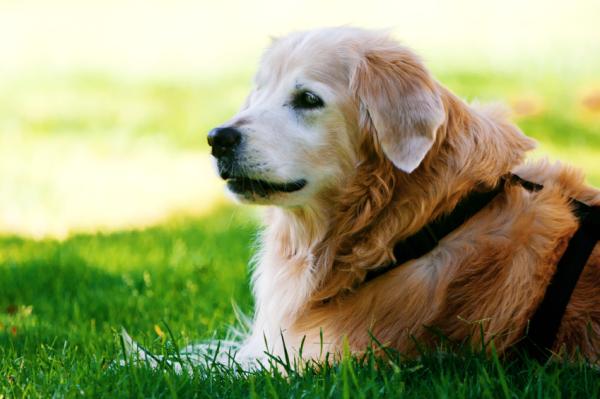
If you want to read similar articles to How to Care for a Golden Retriever - From Puppy to Adulthood, we recommend you visit our Pets category.
Tips
- Golden retrievers are great dogs for agility contests as they have a big energy span.
- They are greatly obedient and clever, which is why they make great guide dogs for the blind.
